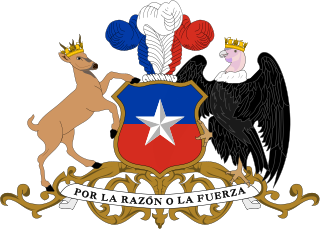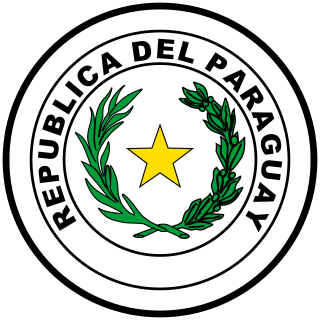
Parliamentary elections in 2000 were held in Haiti in two separate sets of elections, on May 21, 2000 and July 9, 2000, for all 83 seats in the Chamber of Deputies and nineteen seats in the Senate, and later that year, at the same time as November 26, 2000 presidential election for eight Senate seats. The legislative elections and presidential elections in the fall ran largely smoothly, however the first and second rounds of the spring elections generated the most controversy.

Parliamentary elections were held in Chile on 5 March 1961. The Radical Party remained the largest party in the Chamber of Deputies and also became the largest party in the Senate.

Parliamentary elections were held in Chile on 4 March 1973. The Confederation of Democracy alliance won a majority of seats in both the Chamber of Deputies and the Senate.

Parliamentary elections were held in Chile on 2 March 1969. The Christian Democratic Party lost their majority in the Chamber of Deputies, but remained the largest party in both houses.

Parliamentary elections were held in Chile on 7 March 1965. The Christian Democratic Party won a majority of seats in the Chamber of Deputies, the first time a party had held a majority for several decades. The party also became the largest party in the Senate.

Parliamentary elections were held in Czechoslovakia on 18 and 25 April 1920. Voting for the Chamber of Deputies occurred on April 18, 1920, and the voting for the Senate was held a week later on April 25, 1920. The election had initially been planned for mid- or late 1919, but had been postponed.

General elections were held in Belgium on 20 November 1921. The result was a victory for the Catholic Party, which won 70 of the 186 seats in the Chamber of Representatives. Voter turnout was 91.1% in the Chamber election and 91.0% in the Senate election.

General elections were held in Paraguay on 27 April 2003. The presidential elections were won by Nicanor Duarte of the Colorado Party, who received 38.3% of the vote. In the Congressional elections, the Colorado Party won 37 of the 80 seats in the Chamber of Deputies and 16 of the 45 seats in the Senate. Voter turnout was 64.3% in the presidential election, 64.2% in the Senate election and 64.1% in the Chamber of Deputies election.

General elections were held in Mexico on 5 July 1970. The presidential elections were won by Luis Echeverría Álvarez, who received 86.0% of the vote. In the Chamber of Deputies election, the Institutional Revolutionary Party won 178 of the 213 seats, as well as winning all 64 seats in the Senate election. Voter turnout in the legislative elections was 64.4%.

Full general elections were held in Belgium on 14 October 1894, with run-off elections held on 21 October 1894.

Parliamentary elections were held in Brazil on 15 November 1970. The result was a victory for the National Renewal Alliance Party, which won 223 of the 310 seats in the Chamber of Deputies and 40 of the 46 seats in the Senate. Voter turnout was 77.5% in the Chamber of Deputies election.

Parliamentary elections were held in Brazil on 15 November 1978. The National Renewal Alliance Party won 231 of the 420 seats in the Chamber of Deputies and 15 of the 23 seats in the Senate. Voter turnout was 81.7%.

Parliamentary elections were held in Brazil on 15 November 1986. The Brazilian Democratic Movement Party won 260 of the 487 seats in the Chamber of Deputies and 38 of the 49 seats in the Senate. The members of both chambers elected in this election, together with the Senators elected in 1982 came together to form a Constitutional Assembly during 1987 and 1988. The Assembly produced a new constitution, which was promulgated on 5 October 1988.

General elections were held in Romania in December 1928. The Chamber of Deputies was elected on 12 December, whilst the Senate was elected in three stages on 15, 17 and 19 December. The result was a victory for the governing National Peasants' Party-led alliance, which won 348 of the 387 seats in the Chamber of Deputies and 105 of the 110 seats in the Senate elected through universal male vote. Of the 348 Chamber seats won by the alliance, the National Peasants' Party won 326, the Social Democratic Party won 9, the German Party won 8, the Hungarian People's Party won 2 and three were won by Jewish candidates. It is generally regarded as the freest election ever held in Romania until the 1990s.

General elections were held in Romania in July 1932. The Chamber of Deputies was elected on 17 July, whilst the Senate was elected in three stages on 20, 24 and 26 July. The result was a victory for the National Peasants' Party-German Party alliance, which won 274 of the 387 seats in the Chamber of Deputies and 104 of the 113 seats in the Senate elected through universal male vote. Of the 274 Chamber seats, 265 were taken by the National Peasant's Party and nine by the German Party.

General elections were held in Romania in December 1933, the third in three years. The Chamber of Deputies was elected on 20 December, whilst the Senate was elected in three stages on 22, 28 and 29 December. The result was a victory for the governing National Liberal Party, which won 300 of the 387 seats in the Chamber of Deputies and 105 of the 108 seats in the Senate elected through universal male vote.

Parliamentary elections were held in Chile on 7 March 1937. The Liberal Party and the Conservative Party emerged as the largest parties in the Chamber of Deputies and the Senate.

Parliamentary elections were held in Chile on 2 March 1941. The Radical Party emerged as the largest party in the Chamber of Deputies and the Senate.

Parliamentary elections were held in Chile on 4 March 1945. Although the Conservative Party received the most votes, the Radical Party remained the largest party in the Chamber of Deputies and the Senate.

Parliamentary elections were held in Chile on 1 March 1953. The Agrarian Labor Party emerged as the largest party in the Chamber of Deputies, whilst the Liberal Party won the most seats in the Senate.
















